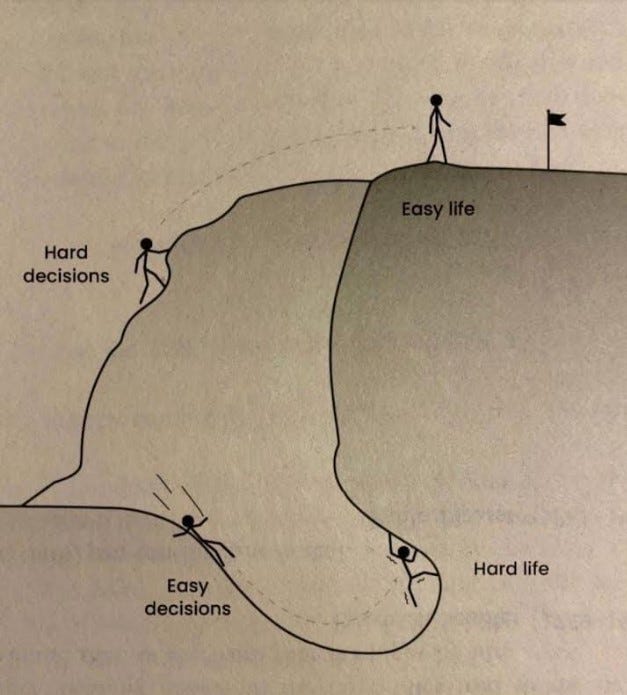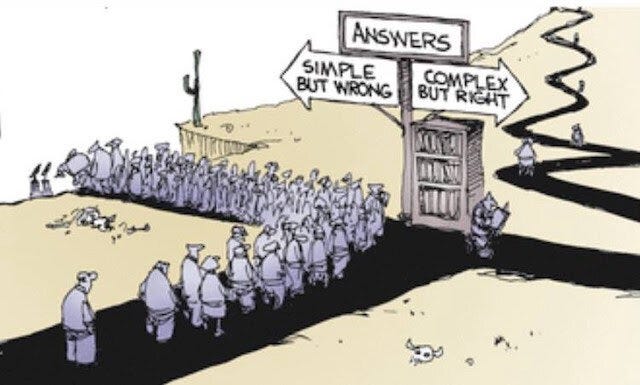Hard Right Over the Easy Wrong
It's Never Easy
Through my years I have had many expressions that I have shared and repeated in earnest. I struggle with whether to call them mantras, slogans, mottos, maxims, axioms, truths, or something else. At their core they have certainly become my truths, my guiding principles (another label). The most enduring of these for me has been, “Do the hard right over the easy wrong.” For me, this phrase emphasizes choosing the morally correct or ethical action, even if it is more difficult, over choosing the easier but morally questionable option. It's about making the right choices even when they are challenging, rather than taking shortcuts or compromising on principles. It’s about integrity and making decisions based on strong moral values. A key factor of this for me is to do so even when nobody is watching.
Especially when nobody is watching.
I can’t remember when I first started challenging myself with this oath (I am going to keep adding labels). My earliest clear memory was when I was a 1st Lieutenant in the Army and serving a role as the Executive Officer. The Commander was the quintessential “good cop,” which left me in the balancing role of “bad cop.” I no longer believe in that form of leadership structure and will address why in a future editorial. It was during that Army role, I think, when I started to share my philosophy with others. Sometimes it would be a challenge. Other times just simple advice.
When I became a high school English teacher, I found myself saying it often. I knew the sad truth that some of the high school students would drink and drive, or ride with someone who would. Each Friday I would share a story, anecdote or statistics about the threat and encourage them to do the hard right over the easy wrong. I would like to think I made a difference one night, with one student, but will likely never know.
When I decided to retire it was a significant challenge for me. I found moral and ethical arguments on both sides. At times it seemed that the hard right would be to keep working. I would have more money to provide for my daughters. I had the energy and passion to still work. I felt like I was providing sound leadership to my team, some of whom I had just hired within the last year. In the end, I realized that staying at the job would only have been the hard right in sheep’s clothing. Not the true hard right.
We only have one shot at this life. I have never cared about money. Some may say, “because you didn’t need to.” The truth is, I have had money and I have been poor. Jim Croce sings a song that includes “with a nickel or a million, I was searching all the time for something that I never lost or left behind.” I can remember as an adult the days of scrambling to find $1.95 in change so we could rent a movie video at Blockbusters. I remember not having potato chips in the house for more than a year because that would be a luxury. Growing up, my Mom made milk out of Carnation powdered milk to save money for a while. Just add water. Yuk. Staying for the money did not seem moral or ethical to me. And it’s not a lesson I wanted to teach my daughters.
I also learned that I didn’t need to stay to be passionate. My sister, Jenny shared with me recently that my niece, Stephanie observed. “Uncle Dan is working harder since he retired than he ever did before.”
My team, to a person, were supportive of my retirement and they are in great hands, continuing to do good things on the planet.
My ex-wife, Shannon, shared the image above with me this morning that inspired me to write this. I don’t like the terms “ex’ or “divorced.” They carry an unnecessary pejorative flavor. Shannon and I kick ass at co-parenting. It is not always easy. But the intrinsic rewards for taking moral and ethical paths last forever.
While reflecting on all of these examples this morning, I came to an epiphany. I love epiphanies. I have had my maxim (that’s my favorite of the labels, I think) slightly wrong all these years. I could use any of the aforementioned examples, but the retirement shines the clearest for me. I almost made the wrong decision because I was thinking about what might be right and wrong for others. At other times, I would think about this intangible the right and the wrong.
Maybe, all along, it should be “Do your hard right over your easy wrong.”
Ralph Waldo Emerson once said, “Trust thyself: every heart vibrates to that iron string.” This past week I read a book called “The Courage to be Disliked.” The book is a conversation between a philosopher and a student, based on a combination of Greek Philosophy and Adlerian Psychology. One of the simple constructs the philosopher reinforced was to understand what your task is and what is the task of others. Both of these readings remind me not only to trust myself, but also be true to myself. My morality. My ethics. When I look at the second image, I find the disparity in numbers gloomy. Maybe more would take the right path if they focused on their hard right opposed to their easy wrong.
I have been asked from time to time how to tell what the hard right is. In a world where there is a model and spreadsheet for everything, not everyone appreciates my answer. You know. In your heart and soul, you know. And if you can separate your hard right from the hard right, it gets even easier to see.
We eventually figured out that Carnation powdered milk was not our hard right.
###




"Do the right thing. It will gratify some people and astonish the rest."
Mark Twain